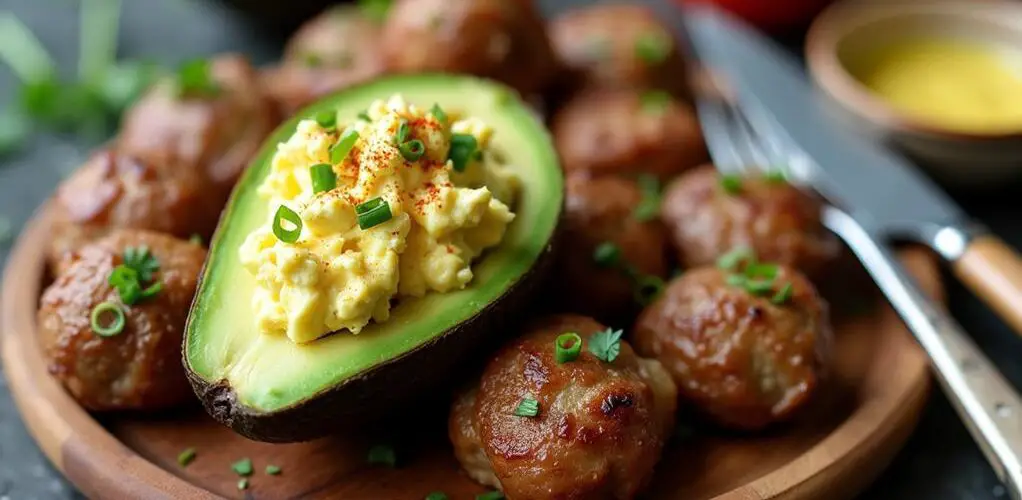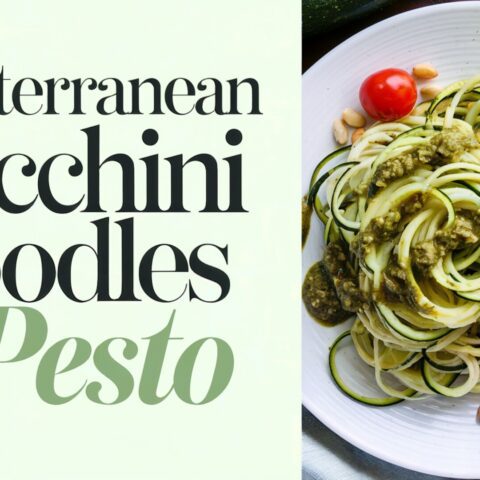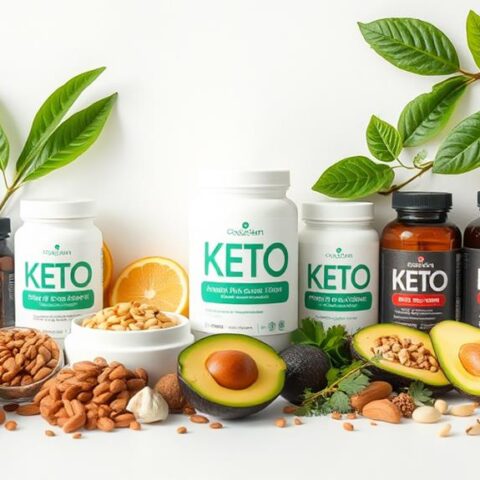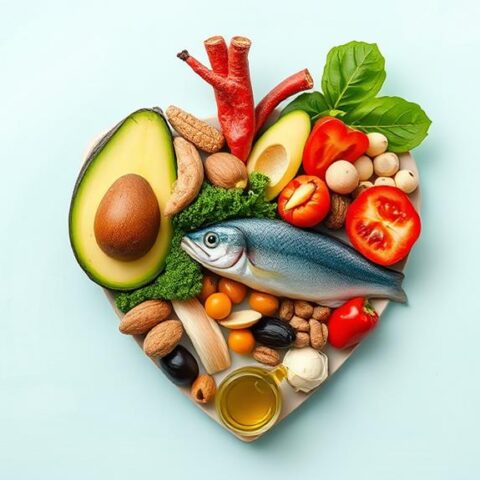
On a keto diet, it is crucial to keep added sugar intake as close to zero grams as possible to maintain ketosis, a state where the body burns fat for fuel instead of carbohydrates. Daily carbohydrate consumption should be limited to 20-50 grams, including natural sugars from whole foods. Exceeding these limits can raise blood sugar levels and disrupt ketosis. Monitoring blood glucose and ketone levels can help determine personal carbohydrate tolerance. To effectively adhere to a keto regimen and guarantee nutritional balance, thorough knowledge about sugar management is invaluable.
Key Takeaways
- Daily carbohydrate intake on keto should be limited to 20-50 grams.
- Ideally, added sugar consumption should be zero grams per day.
- Natural sugars in whole foods contribute to the overall carbohydrate count.
- Hidden sugars in processed foods can easily exceed daily carb limits.
- Regular testing of blood glucose and ketone levels helps assess personal sugar tolerance.
Understanding Sugar on Keto
Understanding sugar on a keto diet is essential for maintaining ketosis, a metabolic state where the body burns fat for fuel instead of carbohydrates. The recommended daily carbohydrate intake on a ketogenic diet ranges from 20 to 50 grams, with added sugar ideally limited to zero grams to guarantee the preservation of ketosis.
Given that sugar is classified as a carbohydrate, its consumption can greatly impact both blood sugar levels and the body's ability to sustain ketosis. Sugar metabolism involves the rapid conversion of sugar into glucose, which raises blood sugar levels and triggers insulin release. This process can disrupt ketosis, as the body shifts from burning fat to utilizing glucose for energy. Consequently, strict monitoring of sugar intake is necessary.
Even natural sugars found in whole foods, while potentially acceptable in moderation, contribute to the overall carbohydrate count and must be carefully managed. Opting for keto-friendly sweeteners like stevia or erythritol can allow for sweetness without affecting ketosis.
Regular testing of blood glucose and ketone levels can provide valuable insights into an individual's personal tolerance for sugar. Additionally, awareness of hidden sugars in processed foods is critical, as these can quickly surpass the daily carbohydrate limit, thus jeopardizing the maintenance of ketosis.
Types of Sugars to Avoid
Avoiding certain types of sugars is paramount for anyone adhering to a ketogenic diet. Added sugars such as sucrose, high fructose corn syrup, and maltodextrin are especially detrimental as they considerably increase carbohydrate intake, potentially hindering the body's ability to maintain ketosis.
This metabolic state is essential for the efficacy of a keto diet, and these sugars can disrupt it by causing insulin spikes and elevating blood glucose levels. Natural sugars, often found in fruits and dairy, also warrant caution. While they are healthier than added sugars, their carbohydrate content can quickly accumulate, potentially surpassing the daily carb limit of a strict keto regimen.
In addition, hidden sugars in processed foods, including cane sugar, agave nectar, and honey, should be meticulously checked on nutrition labels to avoid unintentional carb intake.
Also, low-fat products frequently contain higher amounts of added sugars to compensate for lost flavor, making them unsuitable for a keto diet. Even seemingly healthy options like fruit juices and smoothies can harbor high sugar levels, which can derail ketosis if not carefully monitored.
As a result, opting for sugar substitutes and sugar alternatives can be a more viable option for maintaining ketosis.
Recommended Sugar Intake
Maintaining a ketogenic diet necessitates stringent control over carbohydrate intake, with a specific focus on minimizing added sugars. The recommended daily carbohydrate intake on a keto diet is typically limited to 20-50 grams, with the ideal added sugar consumption being 0 grams to maintain ketosis. This strict limit on carbohydrates guarantees that the body remains in a state of fat-burning rather than glucose-burning.
Significantly, the keto diet also promotes weight loss and appetite regulation by reducing ghrelin levels, a hormone that stimulates appetite, thereby enhancing feelings of fullness.
Most sugars are classified as carbohydrates, making it vital to track both sugars and other carbohydrate sources meticulously. Individual tolerance to sugar may vary, but it is important to keep added sugar as low as possible to prevent exceeding the carbohydrate limit that can hinder fat burning. Monitoring blood glucose and ketone levels can provide valuable insights into personal sugar tolerance, allowing for adjustments in intake accordingly.
To meet the carbohydrate requirements without disrupting ketosis, incorporating high-fiber foods is beneficial. These foods help balance sugar and starch consumption while providing essential nutrients.
Additionally, utilizing sugar alternatives such as erythritol, stevia, or monk fruit can satisfy sweet cravings without negatively impacting ketosis. By managing carbohydrate sources and opting for sugar alternatives, individuals can adhere to the ketogenic diet effectively.
Hidden Sugars in Foods
Many individuals may not realize the extent to which hidden sugars permeate a wide array of foods, posing a vital challenge for those adhering to a ketogenic diet. Processed foods, particularly those marketed as low-fat, often contain hidden sugar sources to enhance flavor. This necessitates meticulous food label scrutiny to identify added sugars, which can undermine the strict carbohydrate limits of a keto regimen.
Additionally, understanding serving sizes is essential to avoid misinterpretation and excessive carb consumption. Alternative names for sugar, such as sucrose, corn syrup, high fructose corn syrup, and malt syrup, are frequently used in ingredient lists, greatly contributing to overall carbohydrate intake.
Foods branded as "healthy" or "natural," including granola bars and flavored yogurt, frequently harbor substantial amounts of hidden sugars, which can derail ketosis. Even products perceived as healthy, such as condiments like ketchup and BBQ sauce, as well as salad dressings, may contain added sugars, emphasizing the importance of vigilance when reviewing ingredient lists.
Furthermore, misleading portion sizes can exacerbate the issue; products that appear low in sugar per serving can lead to excessive carbohydrate consumption if multiple servings are consumed, jeopardizing the ketogenic state. As a result, consistent and thorough examination of food labels is imperative for maintaining a successful ketogenic diet.
Keto-Friendly Sweeteners
When adhering to a ketogenic diet, selecting appropriate sweeteners is vital to maintaining ketosis and overall health.
Keto-friendly sweeteners such as stevia, erythritol, monk fruit, and allulose provide the desired sweetness without the added carbohydrates, calories, or significant impact on blood sugar levels.
Many keto chocolate brands, like Hu Chocolate Bars, use these sweeteners to guarantee their products are low in carbs and high in quality.
These alternatives not only help in satisfying sweet cravings but also offer various health benefits, making them ideal for those managing their carbohydrate intake.
Common Keto Sweeteners
Steering a keto diet often involves finding suitable alternatives to traditional sugar, and fortunately, there are several keto-friendly sweeteners that fit the bill. Among the most popular are stevia, erythritol, monk fruit, and allulose, each offering unique benefits regarding taste and impact on ketosis.
Erythritol, a sugar alcohol, stands out in keto sweetener comparisons for its minimal caloric content—about 0.24 calories per gram—and its lack of effect on blood sugar or insulin levels. This makes it a reliable choice for those adhering strictly to keto guidelines.
Sweetener taste testing often highlights erythritol's similarity to sugar, though some may detect a slight cooling effect.
Monk fruit sweetener, derived from the monk fruit, is approximately 200 times sweeter than sugar. Its intense sweetness allows for smaller quantities to achieve desired sweetness levels, essential for keeping carbohydrates low.
Allulose, a rare sugar, provides about 70% of the sweetness of sugar but only 0.4 calories per gram. This makes it another excellent low-carb alternative for keto dieters, with a taste profile that closely mimics that of traditional sugar.
Sweetener Health Benefits
A notable advantage of incorporating keto-friendly sweeteners, such as stevia, erythritol, and monk fruit, into a ketogenic diet is their minimal impact on blood sugar and insulin levels.
These sweetener varieties provide an effective means of satisfying sugar cravings without the detrimental health impacts associated with traditional sugars. For instance, erythritol is a sugar alcohol that is about 70% as sweet as sugar but contains only 0.24 calories per gram. This makes it a low-calorie alternative that does not disrupt ketosis.
Monk fruit sweetener, derived from the monk fruit, is approximately 200 times sweeter than sugar, allowing for minimal usage while contributing no calories or carbohydrates. This characteristic makes it an excellent choice for maintaining a ketogenic state.
Additionally, allulose, another keto-friendly option, is 70% as sweet as sugar but has 90% fewer calories and is not metabolized by the body, thereby having a negligible impact on blood glucose levels.
Stevia, a natural sweetener with zero calories and carbohydrates, also supports ketosis and can be used to sweeten a variety of foods and beverages.
Collectively, these sweetener varieties offer significant health benefits, allowing individuals to enjoy sweetness without compromising their ketogenic goals.
Health Benefits of Reducing Sugar
Reducing sugar intake offers a myriad of health benefits, making it a critical consideration for those aiming to improve their overall well-being. One of the primary advantages is improved weight management. Excessive sugar consumption is a key contributor to obesity and various metabolic disorders, highlighting the importance of addressing sugar addiction and its metabolic effects.
Stabilizing blood sugar levels is another significant benefit, particularly for individuals with diabetes. Lowering sugar intake reduces the risk of insulin spikes and crashes, promoting more consistent energy levels.
Moreover, a diet with reduced sugar has been linked to a decreased risk of heart disease. High sugar intake is associated with heightened triglycerides and arterial inflammation, both of which are risk factors for cardiovascular issues.
For those following specific diets, such as the keto diet, monitoring and reducing sugar intake is essential for achieving and maintaining ketosis.
Dental health also sees marked improvements when sugar consumption is minimized, as sugar feeds harmful bacteria that cause cavities and gum disease. Additionally, long-term reductions in sugar intake may correlate with a lower risk of certain cancers due to the link between high sugar consumption, chronic inflammation, and obesity.
Consider these specific benefits:
- Improved weight management and reduced metabolic disorders
- Stabilized blood sugar levels, beneficial for diabetics
- Decreased risk of heart disease
- Enhanced dental health and reduced cavities.
Tips for Managing Sugar Cravings

Effectively managing sugar cravings on a keto diet involves strategic approaches such as utilizing keto-friendly sweeteners like stevia, erythritol, or monk fruit, which do not impact carb intake.
Monitoring hidden sugars in processed foods is essential to avoid unintentional consumption that can disrupt ketosis.
Additionally, engaging in meal planning and preparing keto-friendly snacks can help prevent impulsive eating and provide satisfying alternatives when cravings occur.
Including nutrient-dense foods and high-quality fats can also help keep cravings at bay and support overall health.
Utilize Keto-Friendly Sweeteners
For those adhering to a ketogenic diet, managing sugar cravings can be a significant challenge, but utilizing keto-friendly sweeteners offers an effective solution. Sweetener substitutions such as stevia, erythritol, monk fruit, and allulose can satisfy sweet cravings without contributing to carbohydrate intake, thereby supporting ketosis.
Erythritol, a sugar alcohol containing only 0.24 calories per gram, is renowned for not raising blood sugar levels, making it a popular choice among keto dieters. Monk fruit sweetener, approximately 200 times sweeter than sugar, requires only a small amount to achieve the desired sweetness, consequently keeping carb intake minimal. Allulose, a rare sugar, boasts 90% fewer calories than regular sugar and does not affect blood glucose levels, making it an excellent keto-friendly option.
When incorporating these sweeteners, consider the following:
- Stevia: Zero calories and highly potent, perfect for sweetener substitutions in beverages and baked goods.
- Erythritol: Ideal for flavor enhancements in recipes, providing a sugar-like taste without the carbs.
- Monk Fruit: Extremely sweet, use sparingly to maintain low carb intake.
- Allulose: Versatile and low-calorie, suitable for various culinary applications without impacting blood sugar.
Utilizing these sweeteners can effectively manage sugar cravings while adhering to a keto diet.
Monitor Hidden Sugars
Identifying hidden sugars in your diet is essential for maintaining ketosis and managing sugar cravings effectively. Hidden sugar detection begins with familiarizing yourself with nutrition labels and the alternative names for sugar, such as sucrose, corn syrup, and high fructose corn syrup. This sugar labeling awareness is vital because many processed foods contain sugars that can derail your ketogenic efforts.
Pay close attention to portion sizes listed on nutrition labels, as they can often be misleading. Regularly measuring your food can help accurately track carbohydrate and sugar intake, ensuring you stay within your daily limit.
To satisfy sugar cravings without compromising ketosis, consider incorporating low-carb sweeteners like stevia, erythritol, and monk fruit into your diet.
Moreover, prioritizing whole, unprocessed foods can greatly reduce your exposure to hidden sugars, as these options typically contain fewer additives and preservatives.
Engaging with online communities or forums can also provide valuable support and strategies for managing sugar cravings. Shared experiences from these platforms often offer practical insights and motivation, making it easier to stay on track with your keto diet.
Engage in Meal Planning
To successfully manage sugar cravings on a keto diet, engaging in strategic meal planning is fundamental. By planning meals ahead of time, you can avoid high-sugar processed foods, focusing instead on whole, unprocessed ingredients naturally low in sugar. This proactive approach guarantees you are consistently within your carbohydrate limits while still feeling satisfied.
Incorporating high-fiber foods such as leafy greens and avocados can greatly reduce sugar cravings. These foods help you feel full longer, making it easier to maintain your keto regimen.
Meal prep is another essential strategy; by preparing keto-friendly snacks like nuts or cheese, you have satisfying alternatives readily available, reducing the temptation to reach for sugary treats.
Utilizing sugar alternatives such as stevia or erythritol in your recipes can also be advantageous. These alternatives allow you to indulge your sweet tooth without impacting your daily carb allowance.
Keeping a food journal is an excellent way to track your meals and sugar intake, increasing your awareness of hidden sugars and helping you stay on track.
Here are key tips for managing sugar cravings through meal planning:
- Plan meals ahead to avoid processed foods
- Incorporate high-fiber ingredients like leafy greens
- Prepare keto-friendly snacks such as nuts or cheese
- Use sugar alternatives like stevia in recipes
Effective meal planning and ingredient sourcing are fundamental for success on a keto diet.
Frequently Asked Questions
How Much Sugar Takes You Out of Ketosis?
The amount of sugar that disrupts ketosis varies, but typically, consuming over 5-10 grams can exceed an individual's ketosis threshold. Using sugar alternatives can help maintain ketosis by minimizing blood glucose spikes and insulin responses.
Do You Count Sugar on Keto?
Yes, sugar is counted on keto, including hidden sugars in processed foods. Monitoring natural sugars and using sugar substitutes can help maintain ketosis, as exceeding the carbohydrate limit can hinder fat burning and disrupt ketosis.
What Happens if You Eat a Little Bit of Sugar on Keto?
Consuming even a small amount of sugar on a keto diet can trigger an insulin response, potentially disrupting ketosis. This may lead to increased sugar cravings, making it challenging to maintain a low-carb regimen and effective fat burning.
What Should Your Sugar Level Be on Keto Diet?
On a keto diet, maintaining minimal blood sugar levels is essential. Utilizing sugar alternatives can help achieve this, ensuring stability and preventing insulin spikes, thereby supporting metabolic health and sustaining ketosis effectively.
Conclusion
In summary, maintaining a ketogenic diet necessitates a stringent limitation on sugar intake to guarantee the body remains in a state of ketosis. Avoiding high-glycemic sugars, being vigilant about hidden sugars in processed foods, and opting for keto-friendly sweeteners can greatly aid in this process. The health benefits of reducing sugar consumption include improved metabolic health and weight management. Effectively managing sugar cravings is essential for long-term adherence to the ketogenic lifestyle and its associated health benefits.










No Comments